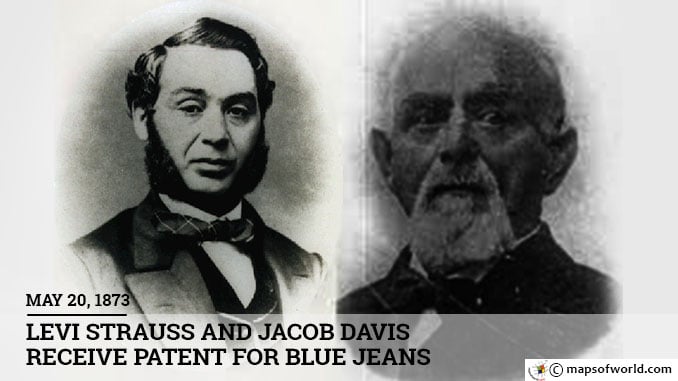Bavaria-born, San Francisco businessman Levi Strauss and a tailor from Reno, Nevada, Jacob Davis received the patent to create work pants reinforced with metal rivets on May 20, 1873. The two then set out to create what would become one of the most famous and best-loved garments across the world – the blue jeans. Loeb Strauss was born in the Buttenheim region of Bavaria, in 1829. When the Strauss family immigrated to the US, young Loeb landed in New York in 1847 to join his brothers Jonas and Louis. The death of his father had left Loeb in charge of the family. By 1850, the young man had changed his name to Levi and went to work in the family dry goods business – J. Strauss Brother & Co. By 1853, Levi Strauss secured an American citizenship but started to get restless. An ambitious man, he believed that his fortunes lay in the west where the heady Gold Rush had started to attract people from all parts of the country and beyond. Initially reluctant to change his occupation, Levi Strauss established a West Coast branch of his family’s wholesale dry goods business in San Francisco under his own name. His family also supported the idea of him acting as the firm’s representative in a quickly expanding western market. Gold miners and fortune seekers poured into California and other western states and stores selling fabric, clothing, and other dry goods mushroomed all over the west. Strauss worked hard and became the principal supplier for most of the stores. When Strauss had initially reached the west coast, he realized that the item that was always short in supply was enduring work pants Initially Strauss had experimented by creating canvas work pants but these were not popular since they tended to chafe. Levi Strauss soon started to substitute a corded French cotton cloth called “serge de Nimes.” This blue fabric later came to be known as denim and the pants were called blue jeans. By 1866, Strauss persuaded the family to move its headquarters to the west. His fame as a man of repute, as an astute businessman, and as an ardent supporter of the San Francisco Jewish community started to grow. Jacob Davis, a Riga-born tailor from Reno, Nevada, was one of Strauss’ regular clients. In 1872, Davis wrote Strauss a letter with suggestions to include his method of strengthening the jeans work pants with metal rivets at the stress points. Adding rivets at the corners of the pockets and the base of the button fly would make them stronger. Davis suggested that Strauss provide the funds and that they share the patent. David and Strauss received the patent for “Improvement in Fastening Pocket-Openings” (US Patent No.139,121), on May 20, 1873. Strauss urged Davis to relocate to San Francisco and to oversee the first facility set up to manufacture “waist overalls” as the original jeans were known. Levi Strauss & Co. initially employed seamstresses who worked out of their homes to supply blue jeans. By the 1880s, the demand for denim jeans grew in great numbers and Strauss decided to open a factory. The “XX” brand manufactured at the unit was renamed 501 in the 1890s and became a craze. The company’s exponential growth became linked to the preference of workers all over the United States for denims as their regular work pants. By the 1920s, Levi’s denim took over the work pants market in the country. By mid-century, blue jeans started to reach out across the oceans and in modern times it is the preferred clothing for men, women, and children across the world. Also On This Day: 1498 – Portuguese explorer Vasco da Gama discovers the sea route to India. 1806 – English philosopher John Stuart Mill is born. 1882 – The Triple Alliance between Germany, Austria-Hungary, and Italy is forged. 1990 – The Hubble Space Telescope sends back its first photographs. 2002 – East Timor becomes an independent nation.
May 20 1873 – Levi Strauss and Jacob Davis Receive Patent for Blue Jeans
Bavaria-born, San Francisco businessman Levi Strauss and a tailor from Reno, Nevada, Jacob Davis received the patent to create work pants reinforced with metal rivets on May 20, 1873. The…
